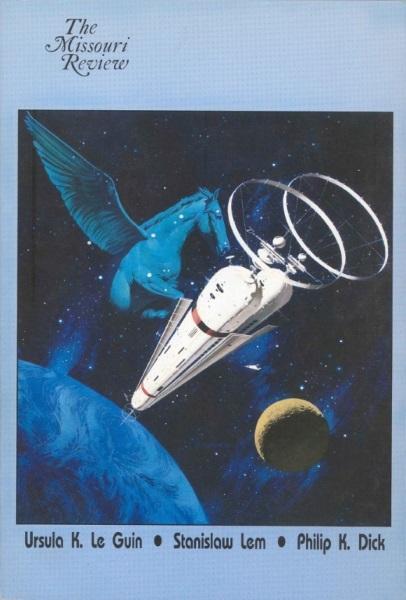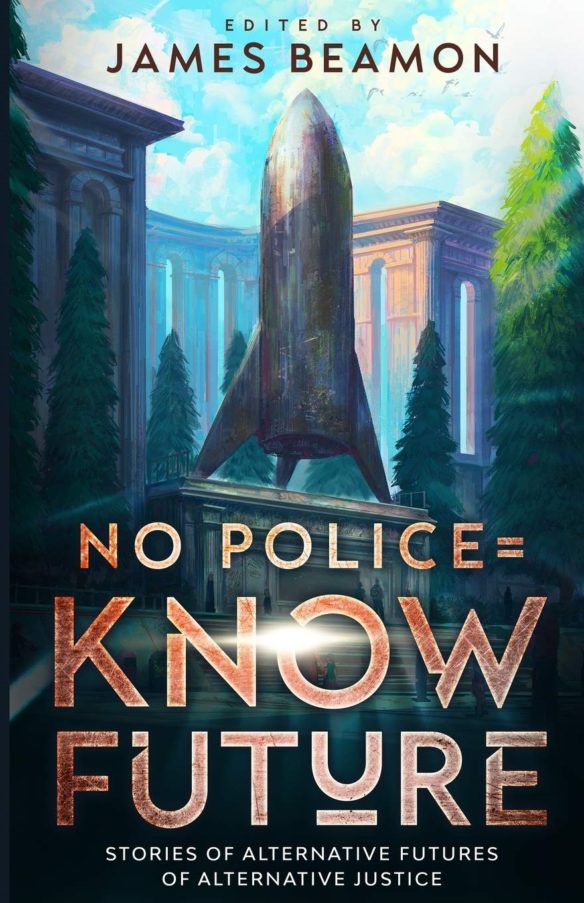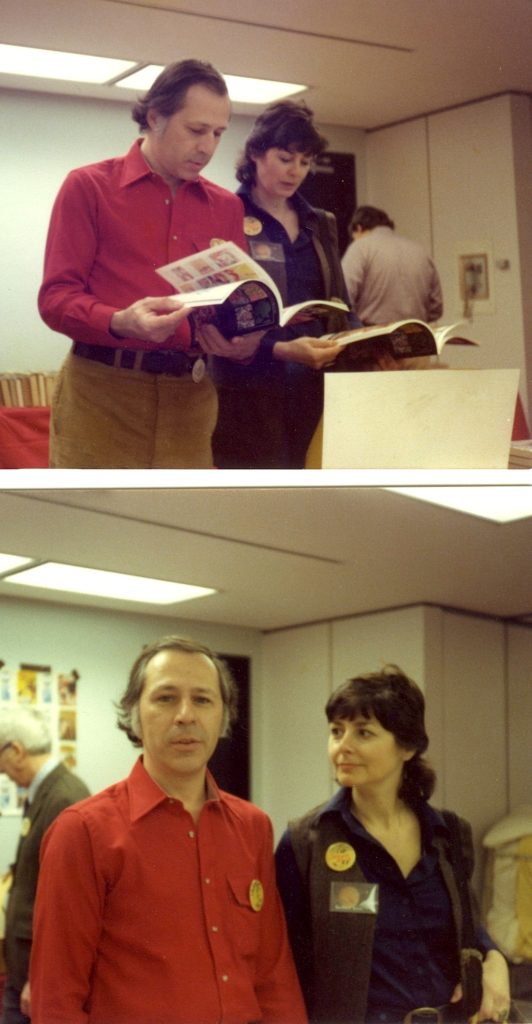(1) INTRODUCING BUTLER TO NEW READERS. Elizabeth Connor describes the work of “repackaging the Patternist Series for the Mother of Afrofuturism” in “How to Give Octavia Butler the Covers She Deserves” at Literary Hub.

…After some back and forth—and plenty of discussion with the editor acting as mediator—we determined that by elegant, they likely meant more stylized human forms in more sophisticated poses, as well as a textural or brushy quality to the art (as there had been on the Parable books), that lent an air of being hand-drawn rather than machine-made. As for dynamic, we soon understood that the symmetry of the earliest comps was what the agent and estate were reacting against. By simply breaking the vertical axis and giving each cover a certain degree of asymmetry—even as the figures revolved around a central “moon” shape that remained static—they felt much more alive. The designer came back with revisions and, in relatively quick succession, Wild Seed and Mind of My Mind had approved covers…
(2) DIFFERENT WISDOM. At the SFWA Blog, Sunny Moraine says “Explicit Sex Scenes and the Work of Stories” are far from mutually exclusive.
The origins of this piece lie in an annoyed Twitter thread I posted, in response to a tweet (possibly joking, I don’t know) to the effect of “movies shouldn’t have sex scenes in them, we’re past that now”.
The origins of my annoyance go back a lot further.
I’ve been writing explicit sex pretty much since I began writing. Like many of us, I got my start in fanfiction, and while fanfiction’s reputation for being heavily smut-focused isn’t entirely deserved, it isn’t entirely undeserved, either. Which is rather the point, because given that I started out writing a lot of explicit sex, I learned quite early just how much story-work one can do with a well-written sex scene. Especially a very explicit one, without a judicious fade-to-black or Vaseline on the camera lens.
I want to be clear about something: I am not claiming ultimate authority over what a “good” sex scene consists of. Sex scenes, like sex itself, are highly subjective and personal, and different people will find that different things resonate.
That said, my opinion is that a good sex scene is usually sexy, and one of the best ways to be sexy is to go deep into not only the physical descriptions of what’s happening, but also what’s going through these characters’ heads as they’re doing the sex.
Which is one of the places where we get into the work explicit sex can do in a story, and in a way really no other kind of scene can manage in precisely this way….
(3) GETTING THE WORD OUT AND THE DOLLARS IN. James Van Pelt shares “The Frustrations (and the Surprising Successes) of Marketing Your Book” at Black Gate.
…Marketing is easy. Effective marketing that actually sells books, however, is hard. My son works for Facebook, so he helped me with an advertising campaign on the platform. We had a $250 budget for one of my collections, The Experience Arcade and Other Stories. One of the ads reached 1,900 readers. 103 people clicked on it. We did sell books, but not enough to pay back our investment. We found the same pattern to be true on the other books we promoted on Facebook….
(4) ON THE PINNACLE. The Hugo Book Club Blog surveys the top sff awards and why they are in “The Award For Best Award”.
… There are in fact enough award systems to warrant the effort of analysis to help decide which awards are worth paying attention to. Of course, dichotomous and divisive “success or failure” judgments are less useful than comparing how they’re organized and speculating about what might contribute to a robust and respected award. Examining the growing pains of recently created awards and thinking about why several smaller awards have managed to establish long-term relevance can also be helpful….
(5) SFRA. The Fall 2020 issue of the Science Fiction Research Association’s SFRA Review is available to download. Many articles and reviews, including an update from Rachel Cordasco about SF in Translation.
(6) WITH OR WITHOUT CHIPS. “’Scenarios of disruption’: Sci-fi writers asked to help guard France” – Australia’s The Age has the story,
Attacks from floating pirate states and hackers on soldiers with neural implants are just two scenarios dreamed up by a “Red Team” of 10 leading science fiction writers tasked with helping the French army anticipate future threats to national security.
“Astonish us, shake us up, take us out of our habits and comfort zone,” Florence Parly, the French defence minister, told the writers at a Defence Innovation Forum this month.
Many of the “scenarios of disruption” that they have been asked to imagine to challenge military planners are to remain top secret to avoid giving ideas to potential enemies. They were asked to stick to potential threats between 2030 and 2060….
(7) SWATTING A NEW FIREFLY. [Item by Olav Rokne.] One for the “wishful thinking” file. Questionably sourced rumors are bouncing around the internet about a Disney+ Firefly reboot. As much as I would love to believe this, I gotta express significant skepticism. Adam Whitehead does a pretty good job of analyzing why this rumour likely ain’t true at The Wertzone: “RUMOUR: FIREFLY reboot under consideration for Disney+”.
… I find this rumour dubious for multiple reasons. The first is that Firefly‘s fanbase remains, despite the passage of almost twenty years, both voluble and passionate. Rebooting the show from scratch and dropping the previous actors and continuity would go down very badly. The second is that Firefly‘s universe was designed from scratch to be slightly more morally murky and complex, and that’s part of the show’s appeal. Making it more PG (or PG-13, if you’re in the USA) seems pointless. …
(8) NEW ALLEGATION AGAINST FLEGAL. Artist Sovereign has attached a three-page statement to her tweet: “Trigger warning: Sexual harassment / 1FW. I am speaking up about the harassment I received from Sam Flegal of One Fantastic Week. I’ve been quiet long enough and there are too many that still deserve an apology.”
(9) SEPTEMBER SONG. The date for a Chicago pulp collectors’ event is sliding later in 2021: “Windy City Pulp and Paper Convention Announces Rescheduled 2021 Dates of September 9 – 12, 2021”. Full details at the link. Doug Ellis begins —
As 2020 draws to a close, we’re feeling pretty confident that we will be able to hold our show in 2021. However, given the current status of the COVID-19 pandemic and the timing on the various vaccines, we became increasingly concerned that it would not be feasible or prudent to hold our show as originally scheduled from April 15-18, 2021.
We can now announce that we’ve reached an agreement with our hotel (the Westin Lombard Yorktown Center in Lombard, Illinois) to reschedule the convention to September 9-12, 2021. The location of the convention remains the same….
(10) MEDIA ANNIVERSARY
1984 — The Winter 1984 issue of the Missouri Review which was undated had Ursula K. Le Guin’s “The Trouble with the Cotton People”, the very first of her Kesh stories that would become part of her Always Coming Home novel which was first published by Harper & Row the following year. Nominated for the Mythopoetic Fantasy Award, it would lose out to Barry Hugart’s Bridge of Birds. Library of America published the Always Coming Home: Author’s Expanded Edition last year.

(11) TODAY’S BIRTHDAYS.
[Compiled by Cat Eldridge and John Hertz.]
- Born December 15, 1923 — Freeman Dyson. Physicist best known in genre circles for the concept he theorized of a Dyson Sphere which would be built by a sufficiently technologically advanced species around a sun to harvest all solar energy. He credited Olaf Stapledon in Star Maker (1937), in which he described “every solar system… surrounded by a gauze of light traps, which focused the escaping solar energy for intelligent use” with first coming up with the concept. (Died 2020.) (CE)
- Born December 15, 1935 – Alma Jo Williams. Five dozen reviews in SF Review. Raised horses; earned a washin-ryu black belt; forty years at Cornell in the Baker Institute for Animal Health. Of the 1984 Dune movie she said “The photography is gorgeous, the music appropriate, the special effects … well integrated…. The metamorphosed Guild navigators are laughable…. the evil of the Harkonnens was caricatured…. Only Sting, as Feyd, projected … subtle nastiness”. (Died 2010) [JH]
- Born December 15, 1937 — John Sladek. Weird and ambitious would be ways to describe his work. The Complete Roderick Is quite amazing as is Tik-Tok which won a BSFA and Bugs as well. He did amazing amounts of short fiction, much of which is collected finally in the ironically named Maps: The Uncollected John Sladek. (Died 2000.) (CE)
- Born December 15, 1944 – Ru Emerson, age 76. Two dozen novels, a dozen shorter stories. Under another name she has two recipes in Serve It Forth. Sings, plays guitar, flies stunt kites, a little Irish hardshoe. [JH]
- Born December 15, 1944 – John Guidry, age 76. Chaired DeepSouthCon 9 & 11, Nolacon II the 46th Worldcon. Founded ERB-apa (Edgar Rice Burroughs fans). Rebel Award. Fan Guest of Honor at DSC 53. [JH]
- Born December 15, 1945 – Steve Vertlieb, age 75. Often seen here. Mr. James H. Burns gave him this tribute on his 70th, with photos and links. [JH]
- Born December 15, 1951 — David Bischoff. He actually started his career writing out for Perry Rhodan. His “Tin Woodman” which was written with Dennis Bailey and nominated for a Nebula would be adapted into a Next Generation story, and he’s continued the Bill the Galactic Hero story with Harry Harrison. He’s also written a kickass excellent Farscape novel, Ship of Ghosts. (Died 2018.) (CE)
- Born December 15, 1953 — Robert Charles Wilson, 67. He won the Hugo Award for Best Novel for Spin, a John W. Campbell Memorial Award for The Chronoliths, a Theodore Sturgeon Memorial Award for the novelette “The Cartesian Theater” and Prix Aurora Awards for the novels Blind Lake and Darwinia. Impressive indeed. He also garnered a Philip K. Dick Award for Mysterium. (CE)
- Born December 15, 1953 – J.M. DeMatteis, age 67. Like many comics stars, has done substantial work for both DC and Marvel, including television. Eisner Award. Wrote Abadazad for CrossGen, then when Disney acquired it, three Abadazad books. One novel. One album from his years as a musician. [JH]
- Born December 15, 1954 — Alex Cox, 66. Ahhh the Director who back in the early Eighties gave us Repo Man. And did you know that he got a co-writer credit for the screenplay of Fear and Loathing in Las Vegas before it was completely rewritten by Gilliam? And as we know he directed a student film version of Harry Harrison’s Bill, the Galactic Hero at University of Colorado Boulder just a few years ago! (CE)
- Born December 15, 1958 – Leslie Smith, age 62. Co-chaired Ditto 7 (fanziners’ con; named for a brand of spirit-duplicator machine). Fanzine, Duprass (see Cat’s Cradle) with Linda Bushyager. [JH]
- Born December 15, 1981 — Krysten Ritter, 39. She played Jessica Jones on the series of that name and was in The Defenders as well. She had a recurring role in the Veronica Mars series which a lot of a lot is us adore (it’s one of the series that Charles de Lint and his wife MaryAnn Hartis are avid followers of, and they contributed to the film Kickstarter) and I supposed it’s sort of genre adjacent, isn’t it? (Do not analyze that sentence.) She’s been in a number of horror flicks as well, but nothing I groked. (CE)
- Born December 15, 1982 — Charlie Cox, 38. He played the role of Matt Murdock / Daredevil in Netflix’s Daredevil and The Defenders, was Tristan Thorn Thorn in Stardust based off the Gaiman novel and Dennis Bridger in the remake of A for Andromeda. (CE)
(12) SF AND WORKERS’ RIGHTS. FutureCon will stream a panel about “Capitalism and workers’ rights on Science Fiction” on Saturday, December 19 at 12 p.m. (noon US Eastern Time). Participants will be Alec Nevala-Lee (USA), Alexey Dodsworth, (Brazil) Fabio Fernandes (Brazil, host), Jorge Baradit (Chile), Marie Vibbert (USA), and Olav Rokne (Canada).

(13) PAWS IN THE ACTION. Sean D talks about a “gorgeous novella” at Nerds of a Feather: “Microreview [Book]: When the Tiger Came Down the Mountain by Nghi Vo”.
It’s hard to pen a story in which the lines are blurred but the narrative is always clear. Ambiguity and warring perspectives can hurricane into incomprehensible pandemonium. However, When the Tiger Came Down the Mountain manages to have characters who not only inhabit both the bodies of animals and humans, but have characters performing oral storytelling that’s just as fluid. What kept me engaged wasn’t rigidity and linearity, but a narrative voice that always had control with a grip greater than any rigidity….
(14) A SFF LOOK AT POLICING. No Police = Know Future edited by James Beamon is available in both print and electronic formats from publisher Amazing Stories and online book outlets.

When the concept of defunding the police (a concept we believe really means re-examining and reforming the concept of policing), arose during this year’s protests, we saw a perfect opportunity to put those beliefs into practice.
James Beamon, our editor, put it this way in his solicitation:
“After the brutal murder of George Floyd by the police, the world responded in righteous protest, with cries of “Black Lives Matter.” The police responded to these calls in large part with even more brutality, with video after video emerging that showed an assault on the public. And more cries came forth, with calls to defund the police.
But what’s that mean?
Science Fiction writers, this is your call to arms. Give us your potential (and hopefully positive) futures that involve alternatives to modern day policing. We want stories that replace the police entirely, dramatically reform them, or create parallel systems to refocus policing. We’re also seeking alternate concepts of rehabilitation and punishment as well, more emphasis on the carrot. In a world where police are perpetually brandishing their batons, I think we’ve all seen enough sticks.”
The stories collected in this volume –
- Ryan Priest – Pro Bono Detectives
- Lettie Prell – Justice Systems in Quantum Parallel Probabilities
- Jared Oliver Adams – All the Mister Rogerses From Bethel A.M.E.
- P.T. MacKim – Well Regulated
- Minister Faust – Freeze Police
- Stewart C. Baker – Maricourt’s Waters Quiet and Deep
- Ira Naymen – When the Call Comes In
- Holly Schofield – One Bad Apple
- Brontë Christopher Wieland – Apogee, Effigy, Storm
- Jewelle Gomez – A More Perfect Union
- Anatoly Belilovsky – Tax Day
(15) IN GENERAL. Paul Weimer finds much to like here: “Microreview [book]: Machine by Elizabeth Bear” at Nerds of a Feather.
… Bear calls out in the acknowledgements the inspiration for Core General that was to me delightfully obvious but perhaps newer readers to SF might not be aware of. James White’s Sector General stories and novels describe the adventures of a hospital in space, and Bear’s Core General is clearly a spiritual successor and heir to White’s ideas. Bear of course brings her own sensibilities and ideas to a Hospital in Space but the bones of the homage are there, and the social mores and ideas of White’s novels are updated for modern sensibilities. This is also done a bit explicitly within the novel itself, as corpsicles found on Big Rock Candy Mountain have some rather archaic, primitive, frankly offensive and un-Synarchy-like ideas about many things. There is a culture clash and some real conflict between Jens and the rest of the Synarchy with Helen, the AI of Big Rock Candy Mountain, and the crew of the ship that they manage to unfreeze and revive….
(16) THE NEXT RIGHT STUFF. “NASA Names Artemis Team of Astronauts Eligible for Early Moon Missions” – the names and brief bios are at the link.
NASA has selected 18 astronauts from its corps to form the Artemis Team and help pave the way for the next astronaut missions on and around the Moon as part of the Artemis program.
…The astronauts on the Artemis Team come from a diverse range of backgrounds, expertise, and experience. The agency’s modern lunar exploration program will land the first woman and next man on the Moon in 2024 and establish a sustainable human lunar presence by the end of the decade.
NASA will announce flight assignments for astronauts later, pulling from the Artemis Team. Additional Artemis Team members, including international partner astronauts, will join this group, as needed….
(17) ROCKING THE MARKET. In “Making A Point With Moon Rocks” on National Review Online, Texas Tech economist Alexander William Salter says that NASA’s contracts to acquire moon rocks (or what is technically “lunar regolith”) is “a clever strategy to nudge space policy in a pro-commerce direction” since the purchases would show that private property can be created on the Moon, a position left ambiguous in the Outer Space Treaty of 1967.
.. NASA’s purchase of moon dirt is a clever strategic move to nudge space policy in a pro-commerce direction. The United States government isn’t violating Article II [of the 1967 Outer Space Treaty], because it’s not appropriating real estate. And it’s not violating Article VI, since it’s up to Congress to determine the extent of monitoring and policing duties. What the NASA program does is create a test case for first harvesting, and then selling, outer-space resources. As David Henderson and I have argued, “Given the vagueness of international space law on property rights, the precedents created by national space law will have a decisive role in shaping the future space environment. Hence, NASA’s actions can support a pro-business turn not just for the United States, but also for the international community as a whole.” …
(18) TODAY’S THING TO WORRY ABOUT. From Fast Company: “What toys from the past can tell us about how we predict the future”.
… What if those predictions actually ended up affecting how the future unfolds, like self-fulfilling prophecies? It’s a question plaguing futurists, and now a project is trying to illustrate the problem by showing how things created in the past have colored the present. The simplest examples—items that truly shape the minds of our next generations—come in the form of children’s toys.
The Museum of Future History’s first exhibition, Toying With Tomorrow: Playthings That Anticipated the Here and Now, is curated by experimental philosopher Jonathon Keats and timed to debut at the UNESCO (the United Nations Educational, Scientific, and Cultural Organization) High-Level Futures Literacy Summit.
The idea was sparked by a growing concern among futurists, Keats says, that we have been “colonizing the future” with visions and predictions of what it will bring, and that those visions limit the opportunities or possibilities of those future generations. But this can be an abstract concept to grasp.
“What we needed was some way in which people could recognize the phenomenon in their own lives, and they could use that as a means by which to consider what sorts of predictions they make, what sort of impact those predictions might have going forward—individually as well as collectively in a society,” Keats explains. “Toys have a very direct way in which they influence the future through the children who play with them.”…
(19) WW84. “Gal Gadot, Patty Jenkins share Wonder Woman 1984 opening scene at red carpet” and SYFY Wire is there.
It’s one thing to watch Diana grow up slowly — something Wonder Woman fans delighting in witnessing as star Gal Gadot lassoed a new generation of hearts in director Patty Jenkins’ 2017 blockbuster. But it’s something else entirely to watch our Amazon hero surge from past to present at lightning speed — leaping out of her idyllic childhood and into the mean city streets — in the butt-kickin’ romp that welcomes viewers to the opening moments of Wonder Woman 1984….
(20) SPACELANES. [Item by Daniel Dern.] Via Slashdot: “Astronomers Discover Cosmic ‘Superhighways’ For Fast Travel Through the Solar System”. Not faster than light, more like “a faster lane on the service road” IMHO.
Invisible structures generated by gravitational interactions in the Solar System have created a “space superhighway” network, astronomers have discovered. ScienceAlert reports:By applying analyses to both observational and simulation data, a team of researchers led by Natasa Todorovic of Belgrade Astronomical Observatory in Serbia observed that these superhighways consist of a series of connected arches inside these invisible structures, called space manifolds — and each planet generates its own manifolds, together creating what the researchers have called “a true celestial autobahn.” This network can transport objects from Jupiter to Neptune in a matter of decades, rather than the much longer timescales, on the order of hundreds of thousands to millions of years, normally found in the Solar System….
(21) MORE ABOUT BEN BOVA. The New York Times ran Ben Bova’s obituary. To accompany that note, here are a couple of Andrew Porter’s photos of Bova (sent direct to 770, not from the NYT.)
…Ben Bova was a hard-science guy — and a passionate space program booster — and his visions of the future encompassed a dizzying array of technological advances (and resulting horrors or delights), including cloning, sex in space, climate change, the nuclear arms race, Martian colonies and the search for extraterrestrials. In newspaper articles, short stories and more than 100 books, he explored these and other knotty human problems….

Photo by and © Andrew Porter 
Ben and Barbara Bova at Boskone (in 1980s?) Photo by and © Andrew Porter 
Photo by and © Andrew Porter 
Ben Bova with Ian Ballantine. Photo by and © Andrew Porterne.
(22) BOVA FINDS. And let Tor.com contributor James Davis Nicoll tell you about “Five SFF Authors Discovered by Ben Bova”. The second of these is —
… John M. Ford’s first professionally published story was “This, Too, We Reconcile,” published in Analog Science Fiction/Science Fact, May 1976. In it, a telepath is hired to read the mind of a martyr to determine if the dead man saw anything of the afterlife as he died and if so, what that afterlife is like. Rather alarmingly, the telepath is the second person hired for the job, his predecessor having committed suicide immediately after reading the martyr’s mind. This has all the earmarks of a task from which one should flee posthaste, but unluckily for our protagonist, his diligence outweighs his prudence.
This is admittedly a minor Ford, which may explain why it was never collected in either of the two Ford collections, From the End of the Twentieth Century (1997), and Heat of Fusion and Other Stories (2004). Nor has it been included in any anthology of which I am aware. Still, Bova saw enough in the story to help launch a career that lasted until Ford’s untimely death in 2006.
(23) HONESTY IS THE FUNNIEST POLICY. [By Martin Morse Wooster.]In “Honest Game Trailers: Marvel’s Spider-Man: Miles Morales” on YouTube, Fandom Games says even though you’re not playing Peter Parker, you can still fly through a very well-detailed New York City and (virtually) cause billions in property damage!
Also dropping today: In “Honest Trailers: Lost” on YouTube, the Screen Junkies sum up the six-season series by saying the characters asked so many questions in the show “The creators got tired of answering them” and that there was so much psychodrama “the writers room needed therapy.”
Fun fact: the reason why the flight that crashed in show was Oceanic Airlines Flight 646 was that was the flight in the action film Executive Decision.
[Thanks to Michael Toman, Martin Morse Wooster, John King Tarpinian, John Hertz, Mike Kennedy, JJ, Cat Eldridge, James Davis Nicoll, Michael J. Walsh, Daniel Dern, Olav Rokne, Steve Davidson, Doug Ellis, and Andrew Porter for some of these stories. Title credit goes to File 770 contributing editor of the day Olav Rokne.]
Discover more from File 770
Subscribe to get the latest posts to your email.

(11) Love Robert Charles Wilson – Burning Paradise is the most recent I’ve read of his.
Clickity
10) While Always Coming Home doesn’t seem to register on SF/F radars the way that other Le Guin novels do, I am very fond of the novel. It feels like she is on the absolute top of her prose game in this one. And of course there is the audio component of the novel by Le Guin and Todd Barton, which you can get here.
11) Per Robert Charles Wilson, I would also like to give a shout-out to one of my favorite novels The Harvest. I think it could help define the term “literary SF.”
Rob Thornton says While Always Coming Home doesn’t seem to register on SF/F radars the way that other Le Guin novels do, I am very fond of the novel. It feels like she is on the absolute top of her prose game in this one. And of course there is the audio component of the novel by Le Guin and Todd Barton, which you can get here.
Rob, that link definitely doesn’t go where you wanted it to go.
Thanks. Here is the link:
https://ursulakleguintoddbarton.bandcamp.com/album/music-and-poetry-of-the-kesh
So I had to call MaineCare to straighten out some small coverage details and while I was on the phone decided to deal with an issue that came that summer during my fifty day long stay for treatment of a staphylococcus infection.
During my first week there, a billing reconciliation agent called me when I been moved to a private room per order of the Unit charge nurse. The Hospital agent told me that MaineCare wouldn’t cover the bill and I needed to be moved to a less expensive room. I said no, the charge nurse said the same as it was medically needed and the agent said I’d be responsible for the bill. All of it. Now I knew that was bullshit so I didn’t worry.
So yesterday I asked Sherry how much that bill was. All told she said it was two hundred thousand dollars. And MaineCare needed to remind the hospital that it was illegal to pressure patients in this manner as MaineCare always paid these bills. Weirdly Sherry noted my one day stay in October to remove the hardware from my knee cost eleven thousand dollars which she said made no sense.
@Cat Eldridge,
I am glad you are getting healthcare, and best wishes for recovery. It does seem like it’s been going on a long time.
I was gobsmacked to read the “two hundred thousand dollars” charge. I struggle to understand how this sort of thing can happen in a (supposedly) developed country. I think the exorbitant cost of healthcare in the USA has contributed to the COVID19 pandemic being worse than it needed to be.
11)/Freeman Dyson — It always comes back to Stapledon, doesn’t it?
Soon Lee says I am glad you are getting healthcare, and best wishes for recovery. It does seem like it’s been going on a long time.
Over three years now since the dying. though it’s complicated by a head trauma and other injuries from a motorcycle accident in the Eighties. These injuries were in May.
I was gobsmacked to read the “two hundred thousand dollars” charge. I struggle to understand how this sort of thing can happen in a (supposedly) developed country. I think the exorbitant cost of healthcare in the USA has contributed to the COVID19 pandemic being worse than it needed to be.
It certainly complicates things. Keep in mind that I’m a complicated case so I had a lot of imaging done which is costly, plus a second fall in the hospital got a trauma team involved. But four thousand dollars a day is expensive no doubt.
Anybody know if Simon Jimenez is still eligible for the Astounding Award? I just finished The Vanished Birds, and well, kinda dayum.
I know Jimenez has published some shorts, but I don’t know the time frame so I don’t know if he’s still eligible.
ISFDB only lists The Vanished Birds for Jimenez, so the short stories are either not genre or were published in venues so obscure that ISFDB doesn’t know them. So I’d say that Jimenez is eligible for the Astounding Award.
@Rob Thornton
The writing in Always Coming Home is very fine, and back in the 80s I used to say it was LeGuin’s best novel. (As contrasted with The Dispossessed, which was and is my favourite.) I came back to it last year, though, and I found less in it than I remembered. Perhaps I’ve done more thinking about what’s now called post-civ or anti-civ, or perhaps it’s just that I’m too much of a digital native now to appreciate Kesh culture. I do think it’s a pity it’s dropped out of visibility, though – it deserves better.
@Cora —
Thanks. This is all I know:
“Simon Jimenez’s short fiction has appeared in Canyon Voices and 100 Word Story’s anthology of flash fiction, Nothing Short Of. ”
If he’s eligible, he’s damn sure on my list.
I got into RCW with the Chronoliths, which of course have come to mind with the mysterious monolith shenangians in Utah.
in re Machine: In the running as my as yet undefined favorite book of the year. (to be honest, it’s got competition from only maybe 2 other books)
Sophie Jane says The writing in Always Coming Home is very fine, and back in the 80s I used to say it was LeGuin’s best novel. (As contrasted with The Dispossessed, which was and is my favourite.) I came back to it last year, though, and I found less in it than I remembered. Perhaps I’ve done more thinking about what’s now called post-civ or anti-civ, or perhaps it’s just that I’m too much of a digital native now to appreciate Kesh culture. I do think it’s a pity it’s dropped out of visibility, though – it deserves better.
I’m sure that Kesh culture isn’t anti-digital. “Yimenin the Valley” is computer based, and “Pandora Converses with the Archivist of the Library of the Madrone Lodgeat Wakwaha-na” refers to them. “Messages Concerning the Condor” is yet another story that refers to computer networks. It’s just not as visible as it could be.
Now listening to Seanan McGuire’s Indexing Reflections
This won’t be out till late next year, but there’s a comics adaptation of Jeff VanderMeer’s early story “Secret Life” in the works. https://www.facebook.com/jeff.vandermeer/posts/10158079434804195
I haven’t read the story, but VanderMeer + Theo Ellsworth seems to me like a fruitful combination. Ellsworth isn’t a fantasy illustrator in a traditional genre sense, more of a psychedelic folk artist— really unusual evocative style that I can imagine working with VanderMeer’s prose better than a more literal approach.
@Contrarius
Simon Jimenez
“History of Music” Canyon Voices Fall 2014 pp. 43-51
link
“Invite Him In, Ask For Help” in Nothing Short Of: Selected Tales from 100 Word Story ed. by Grant Faulkner. Outpost 19: San Francisco, 2018.
link
An SF fan does not like “Tropic of Cancer”:
https://twitter.com/jessesheidlower/status/1339231862770851841
@Cat Eldridge I’m sure that Kesh culture isn’t anti-digital.
They aren’t, but anything digital belongs to the City of Mind, which they don’t really acknowledge as part of their culture or their community even while they make use of it. I used to think that was a weakness of the writing, then I decided it was part of the point – the City is the other half of a Taoist opposition. Now, though, I’m not sure.
The “digital native” thing is perhaps a bit more personal, though. It seems silly to object to a work of speculative anthropology on the grounds that I wouldn’t want to live there, but… I wouldn’t, and it makes the implicit argument about other ways we might relate to time, and gender, and the world less persuasive.
In terms of Robert Charles Wilson, I think “Last Year” is the overlooked gem among his books. Really first-rate novel.
@bill —
Thanks, bill!
From writertopia:
“Which publications qualify?
Any publication meeting one of the following criteria:
1 — Copy print run of at least 10,000
2 — Qualifying publication by SFWA (see the list)
3 — Publications which have a nominal pay rate, particularly those designated by the award sponsor (Dell Magazines).
— Nominal is defined by SFWA membership requirements, currently at 6c/word with a minimum of $50 total.
4 — A published work of fiction of a minimum of 40,000 words either sold to a small press or self-published for which the author can demonstrate net income of at least $3,000 within one year. Income can be in the form of advance, royalties, or some combination thereof.”
http://www.writertopia.com/awards/eligibility/campbell
So now I have to figure out if these publications qualify under 1-3 or not!
2) From my perspective, there are too many Lego-sex scenes where the characters do the horizontal mambo for the sake of doing the horizontal mambo. It frequently detracts from the story rather than advancing it.
Peter V. Brett’s “Demon Cycle” series provides examples of how to do sex scenes well. N.K. Jemisin did a pretty good job in that area as well.
7) Firefly is already PG/PG-13. I’d like to see a re-boot. Based on The Mandalorian, I think Disney could do a good job with Firefly.
Separately, I got tired of waiting for the estate/rights holders of Always Coming Home to issue an ebook edition. Abe Books to the rescue!
In case I don’t pop up again, Happy Holidays and Merry Christmas to one and all!
Regards,
Dann
“It used to be said that it is better to light one candle than to curse the darkness. Today, we admire those who curse the candle—because it is not perfect, not free, not whatever the complainers want it to be.”–Thomas Sowell
Addendum:
Okay, Canyon Voices doesn’t qualify. It’s a university publication, not pro, and it only publishes online, and I don’t think it pays anything at all.
The second one might qualify.
https://www.amazon.com/Nothing-Short-Selected-Tales-Story-org/dp/1944853480/ref=tmm_pap_swatch_0?_encoding=UTF8&qid=&sr=
Copy print run of 10,000? Likely to have paid at least $50? What think y’all?
16) “It’s GOOD to be Black on the Moon!”
Astronaut Tawny Newsome (Angela Ali) on the 2020 series, Space Force…
@Olav Rokne: I’ve put “Last Year” on my list
“When you get caught between the Moon-moth and the City We Became”
Contrarius: The second one might qualify. Copy print run of 10,000? Likely to have paid at least $50? What think y’all?
Not a chance. Jimenez had to pay $2 to submit that story originally (which would have disqualified the venue right there), and it doesn’t say anything about paying for the stories they accept for publication.
Even if they offered him money to include his 100-word story in the anthology, it wouldn’t have been anywhere near $50. There are 111 stories in it; if they paid each author $50, it would have cost them $5,550 just to acquire the stories for a book they are selling for $12 a pop (requiring them to sell 463 copies just to pay off the stories, and none of their other expenses).
The anthology is essentially a fiction zine. I think it most likely that the submission form included a “by submitting, I am agreeing that the publishers have the non-exclusive right to publish this story on their website and in other publications” clause. There’s no way this is a SFWA-qualified venue, and Jimenez is almost certainly eligible for the Astounding Award.
Dann665: Firefly is already PG/PG-13.
Serenity is most certainly not PG.
Dann665 says Separately, I got tired of waiting for the estate/rights holders of Always Coming Home to issue an ebook edition. Abe Books to the rescue!
Since Le Guin just passed on, I assume it was the onus of her agent to find a publisher for a digital edition as she was the copyright holder. The last USA print publisher prior to her death was the University of California Press and I don’t know if they do digital editions; the UK publisher last was Gollancz which I’m fairly sure doesn’t. There’s virtually nothing available from the usual digital suspects for her currently which is a pity.
Back to the matter of Le Guin. Oddly enough she fairs much, much in the matter of audiobooks as there are over thirty titles available currently including the Earthsea trilogy, The Dispossessed, Both volumes of The Unreal and The Real, Changing Planes (a favorite of mind) and The Left Hand of Darkness. Not Always Coming Home though…
@Cat
UC Press does do digital editions, but they don’t have one for that book. Their softcover is $25, available from various sellers, plus, of course, the publisher.
PJ Evans says UC Press does do digital editions, but they don’t have one for that book. Their softcover is $25, available from various sellers, plus, of course, the publisher.
It’s a lovely edition though I prefer the boxed edition that came with a cassette with the music of the Kesh People. The softcover edition was oversized which was nice too.
Always Coming Home is available in ebook in the UK, under the SF Masterworks imprint. (Gollancz do quite a lot of ebooks although most of them aren’t under the Gollancz label)
P J Evan says UC Press does do digital editions, but they don’t have one for that book. Their softcover is $25, available from various sellers, plus, of course, the publisher.
The American digital edition is from Library of America which is the Author’s Expanded Edition. No idea how different it is as from the SF Masterworks imprint digital edition in the U.K. as it has no explanatory notes.
@JJ
Those are two subtly different works, IMO. Re-booting Firefly as a series could be done without sacrificing the original themes or Disney’s “family friendly” market position.
@Cat Eldridge
I pawed through Amazon and UC Press several times hoping to find a magical backdoor link to just a plain old digital copy. UC Press seems to be focused on presenting Always Coming Home as an educational tool with supplemental materials rather than having a standalone version appropriate for general readers.
Their choice. I think it is a poor one.
Regards,
Dann
A wise and frugal government, which shall restrain men from injuring one another, shall leave them otherwise free to regulate their own pursuits of industry and improvement, and shall not take from the mouth of labor the bread it has earned. – Thomas Jefferson
@JJ —
Thanks for the additional input. Onto my list he goes! And I recommend the book for everyone else’s consideration. Available through Audible, Amazon, probably your local library (if mine has it, probably most others do), and most of the usual suspects, though sadly not through Scribd!
The Vanished Birds by Simon Jimenez, Del Rey Books, 1/14/20
@Contrarius
One of the folks in my book club, Marshall (@EconoBoyd on Twitter) insisted on Vanished Birds as the first book we read after Worldcon (we always spend the months before Worldcon reading any finalists we hadn’t read yet).
One of the few books we’ve read where everyone in the book club had good things to say about it. Interestingly though, everyone liked the book for different reasons.
(14) Kind of interesting side note, Minister Faust who has a story in that collection is in charge of communications at the labour union of which I’m currently a member.
@Olav —
Thanks for that link.
And yup — everything you talk about in your review is in there, but I liked it for entirely different reasons! 🙂
According to an article on tor.com the SF Masterworks edition of Always Coming Home doesn’t have the additional material.,
Paul King says According to an article on tor.com the SF Masterworks edition of Always Coming Home doesn’t have the additional material.
I wouldn’t expect it to have any additional material as it’s just a reprint of the existing edition but I was surprised that the Author’s Expanded Edition didn’t either as these things usually do. It doesn’t even have a brief preface.